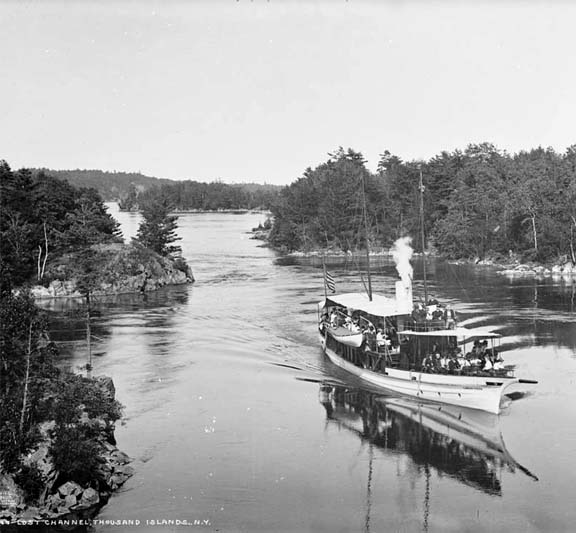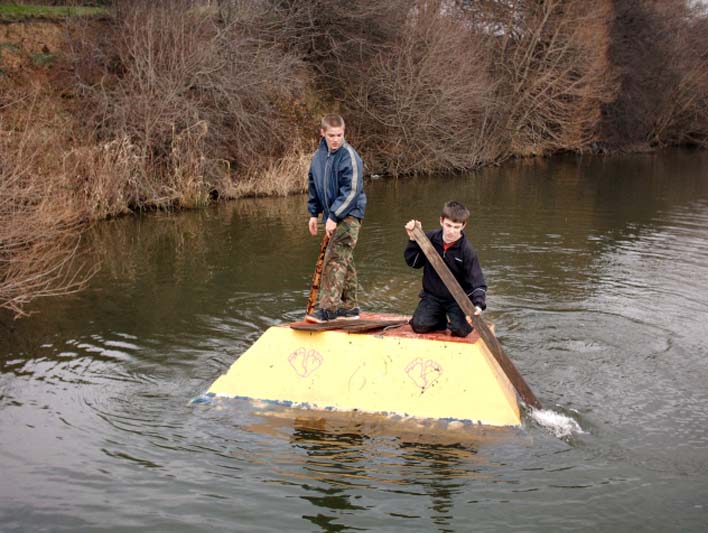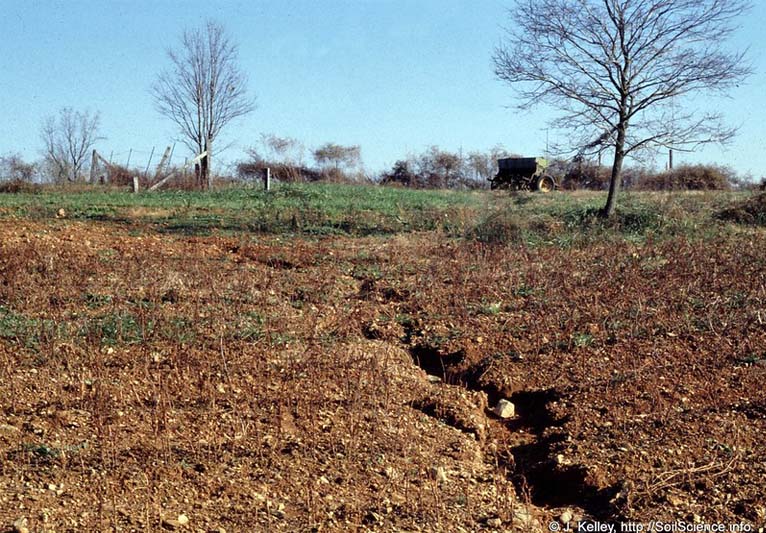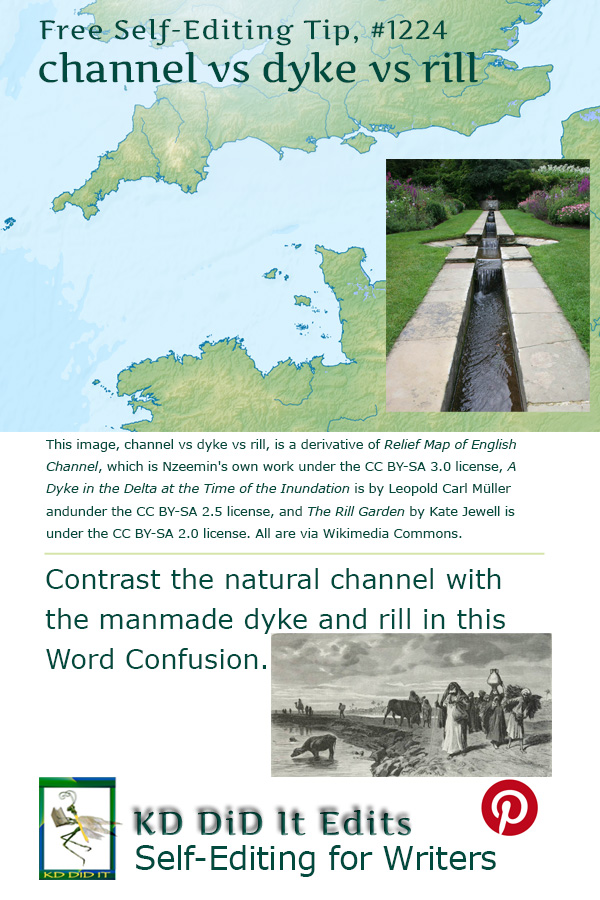Yep, I’m still channeling on about the water. Who knew there were so many types of bodies of water?
In this watery word confusion, it’s all about the water channels: channel vs dyke vs rill.
A channel is a natural, navigable, narrower passage of water that comes between two larger bodies of water. Think of it as wider than a strait. A distributary channel is a stream that flows away from the main channel of a river.
A dyke (or the more archaic spelling preferred by Americans, dike) can be a ditch (depending upon where you live) or an artificial watercourse. Mostly, however, it’s an embankment built as a barrier to water or to drain the land.
A rill a small, shallow channel of water that may be natural or artificial.
NOTE: This post ONLY addresses a channel, dyke, or rill in their role as bodies of water.
Exploring Later . . .
You may want to explore “Anchorage, Haven, Moorage, and Roadstead“, “Arroyo vs Coulee vs Wadi vs Wash“, “Bay vs Bight vs Cove“, “Bayou vs Bog vs Marsh vs Swamp“, “Beach vs Coast vs Shore“, “Born vs Borne vs Bourn“, “Brook vs Burn vs Draw vs Lick“, “Canal vs Impoundment vs Moat vs Reservoir“, “Cay vs Key vs Quay“, “Creak versus Creek“, “Dam versus Damn“, “Delta vs Estuary vs Rapids vs Source“, “Dock vs Pier vs Wharf“, “Firth vs Fjord vs Gulf“, “Harbor vs Marina vs Port vs Quay“, “Lakes: Kettle, Loch, Mere, and Oxbow“, “Lagoon vs Salt Chuck vs Tide Pool“, “Ocean versus Sea“, “Peer versus Pier“, “River vs Stream vs Tributary“, “Rivulet vs Runnel vs Sike“, “Lagoon vs Salt Chuck vs Tide Pool“, “Sea versus See“, “Slew versus Slough“, and “Straight versus Strait“.
Word Confusions . . .
. . . started as my way of dealing with a professional frustration with properly spelled words that were out of context in manuscripts I was editing as well as books I was reviewing. It evolved into a sharing of information with y’all. I’m hoping you’ll share with us words that have been a bête noire for you from either end.
If you found this post on “Channel vs Dyke vs Rill” interesting, consider subscribing to KD Did It, if you’d like to track this post for future updates.
| Channel | Dyke | Rill |
|---|---|---|
 |
 |
 |
| Part of Grammar: | ||
| Noun
Plural: channels |
Noun 1, 2
Plural for the noun: dykes, dikes Alternative spelling: dike |
Noun; Verb, intransitive
Plural for the noun: rills |
A length of water wider than a strait, joining two larger areas of water, especially two seas or between a continent and an island
[Nautical] A navigable route between two bodies of water |
Noun: A ditch, fosse, or watercourse |
Noun: A small stream
A very small brook
[Physical Geography] A small channel or gulley, such as one formed during soil erosion [Astronomy; also rille] One of many winding cracks on the moon Verb, transitive:
|
| Examples: | ||
| The Great Bras d’Or Channel connects parts of Bras d’Or Lake.
The movement has spread across the Channel. Buoys marked the safe limits of the channel. The river is confined in a narrow channel. Channels can be defined as wider straits. A channel is a natural formation while a canal is manmade. |
Dykes can prevent flooding or drain a flooded area.
More recent dating methods put the construction of Offa’s Dike in the early 5th century. Rippingale Running Dike carries a stream, which leads water from the catchwater drain. “The property is bisected by an immense straight dike, which is called the Middle Wash, and which is so sluggish, so straight, so ugly, and so deep, as to impress the mind of a stranger with the ideas of suicide” (Trollope). |
Noun: “It grows as steadily as the rill oozes out of the ground” (Thoreau). “This gorge was dammed and the waters of the lake collected: the Susquehanna was converted into a rill” (Cooper). “Hence he determined to abandon himself to the stream of feeling, and perhaps was surprised to find what an exceedingly shallow rill it was” (Eliot, ch 7). “Over millions of years, the river and its tributaries have carved a fanlike rill of dramatic canyons out of the ancient sediments of the Mesa Verde tablelands, a maze of vertiginous stone walls” (Wise). A rill can be a precursor to a brook, creek, stream, or river. If rills are allowed to go unchecked, they can become gullies. “Typically, a rille can be several kilometers wide and hundreds of kilometers in length” (Rille). Verb, transitive: “And fainter, finer, trickle far To where the listening uplands are; To pause—then from his gurgling bill Let the warbled sweetness rill, And down the welkin, gushing free, Hark the molten melody;” (Hopkins, pp 81-86). “Alladad Khan was panting hard, soaked in sweat, and his rolled-up sleeve was all blood, blood rilling down his arm” (Burgess, p 158). |
| Derivatives: | ||
| Adjective: multichanneled, multichannelled, nonchanneled, unchanneled, unchannelled Noun: channeler, channeller [British] Verb: channel-hop |
Adjective: diked, dyked, undiked Noun: diker, dyker |
|
| History of the Word: | ||
| Middle English from the Old French chanel, from the Latin canalis meaning pipe, groove, channel, from canna meaning reed. |
|
Mid-16th century and probably of Low German origin. |
C’mon, get it out of your system, bitch, whine, moan . . . which words are your pet peeves? Also, please note that I try to be as accurate as I can, but mistakes happen or I miss something. Email me if you find errors, so I can fix them . . . and we’ll all benefit!
Satisfy your curiosity about other Word Confusions on its homepage or more generally explore the index of self-editing posts. You may also want to explore Book Layout & Formatting Ideas, Formatting Tips, Grammar Explanations, Linguistics, Publishing Tips, the Properly Punctuated, Writing Ideas and Resources, and Working Your Website.
Resources for Channel vs Dyke vs Rill
Some of these links may be affiliate links, and I will earn a small percentage, if you should buy it. It does not affect the price you pay.
Apple Dictionary.com
Burgess, Anthony. “Time for a Tiger.” The Malayan Trilogy. Originally published 1956. VINTAGE (RAND), 1996. <https://amzn.to/49buVRJ>. Print.
Cooper, James Fenimore. The Pioneers. Originally published 1823. CreateSpace Independent Publishing Platform, 2013. <https://amzn.to/3FzCqo8>. Print.
Eliot, George. Middlemarch. Originally published 1871. Global Publishers, 2023. <https://amzn.to/46P6XKG>. Ebook.
The Free Dictionary: dike
Hopkins, Gerard Manley. “Il Mystico.” Originally published 1862. Poetry Nook.com. n.d. Accessed 26 Oct 2023. <https://www.poetrynook.com/poem/il-mystico>.
“Rill.” Wiktionary. 1 Sept 2023. Accessed 26 Oct 2023. <https://en.wiktionary.org/wiki/rill#Verb>.
“Rille.” Wikipedia. 1 Jan 2023. Accessed 26 Oct 2023. <https://en.wikipedia.org/wiki/Rille>.
Thoreau, Henry David. Walden & on the Duty of Civil Disobedience. Originally published 1849. 2023. <https://amzn.to/498xlRa>. Print.
Trollope, Anthony. John Caldigate. Originally published 1879. 2021. <https://amzn.to/3FxA8Wq>. Ebook.
Wise, Jeff. “The 4 Stages of Fear, Attacked-by-a-Mountain-Lion Edition.” Discover Magazine. 19 May 2010. Accessed 26 Oct 2023. <https://www.discovermagazine.com/mind/the-4-stages-of-fear-attacked-by-a-mountain-lion-edition>.
Pinterest Photo Credits:
Relief Map of English Channel is Nzeemin‘s own work is under the CC BY-SA 3.0 license, A Dyke in the Delta at the Time of the Inundation by Leopold Carl Müller is under the CC BY-SA 2.5 license and The Rill Garden by Kate Jewell is under the CC BY-SA 2.0 license. All are via Wikimedia Commons.
Revised as of 3 Sept 2024
By: Kathy Davie


